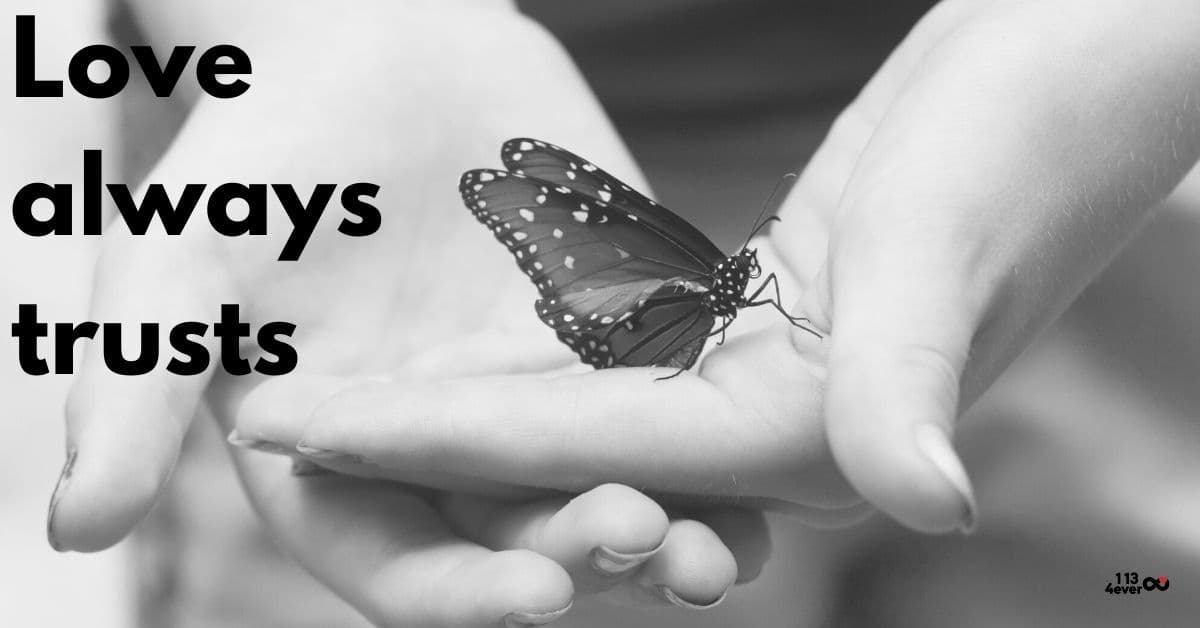1 Corinthians 13 was written to a group that was having trust issues. When Paul wrote this letter, he was guiding the group to let them know that for the group to succeed, trust would be needed.
Strong relationships have strong trust
Trust is a fundamental element for relationships. Its is integral for successful relationships. It provides relationships with a stable foundation to build upon. Relationships that lack trust struggle to grow. They are weaker. Like a house with a weak foundation, relationships with a weak sense of trust tend to have more problems and are in need of repair.
Relationships must have trust to give and receive love. Some studies have found that one of the top reasons relationships do not survive is because of lack of trust.
Trust is the faith you have in someone that you can rely on them and they can rely upon you. It’s a partnership with you and that other person. Trust allows those in the relationships to be their authentic selves and the understanding they are accepted for who they are, shortcomings and all.
Trust helps relationships work through times of difference and struggle. During the times when the parties in the relationship are not on the same page, trust makes it easier for the relationship to navigate through the differences or misunderstandings.
Trust requires one to let down their guard and be vulnerable. This enables one to give more into a relationship because they do not have to continually be defensive. Instead of putting up a protective wall, they allow themselves to step into the relationship and be more present in the relationship.
Trust takes time to build strong and successful relationships. Trust does not happen overnight. It is earned. Relationships can either get stronger or weaker from challenging times. The stronger relationships use the challenge to learn and grow. It helps everyone in the relationship understand where trust was strong or weak so they can adapt for future situations.
Trust in a relationship means you can rely on your partner. You believe they have your best interests in their hearts. It also means that you have your partner’s best interest in your heart. You have faith and confidence in them.
Trust requires forgiveness. We will not always be on the same page as our partner. We will get hurt and we will hurt others by our words, decisions and actions. How we forgive and move forward from situations helps define the trust in our relationships.
Our upbringings, prior situations and relationships all help shape and define how we see the world and react to our current relationships. We’ve been hurt from certain situations and can be very protective to not allow that to happen again. Our past can influence and impact our current relationships. If we have lack of trust in a relationship, we need to determine if that is from our past or from the current relationship.
There are plenty of reasons of why not to trust, especially when in an unhealthy relationship. If trust is unattainable, then it might be time to look for ways to get out of that relationship so that you can find a relationship where you can grow more trust.
Trust in yourself is a key element for self-love
A common cry in relationships is “If you could just have a little faith in me!” Unfortunately, we often don’t have enough faith in ourselves.
Self-trust is very important. Love always trusts and it begins with you. Trust that you are a good person. Trust that you bring good to this world. It can help bring trust to all your important relationships.
Love always trusts
Trust can be very challenging. It takes time. When you are looking to improve or grow your relationship, reflect on these three powerful words from 1 Corinthians 13. Ask yourself what they mean to you. Where in your relationships is trust strong and where is trust weak? What is in your control to trust? How can you trust more?
Trust is a journey. It does not happen overnight. Let down your guard. Love grows with trust.



